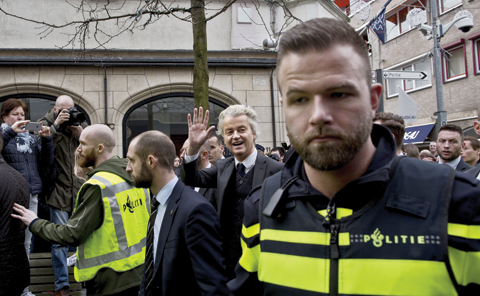Election manifesto pledges to 'de-Islamize' Netherlands
 HEERLEN: Firebrand anti-Islam lawmaker Geert Wilders (second right) surrounded by police officers and security guards as he waves to supporters during a campaign stop in Heerlen, Netherlands. — AP
HEERLEN: Firebrand anti-Islam lawmaker Geert Wilders (second right) surrounded by police officers and security guards as he waves to supporters during a campaign stop in Heerlen, Netherlands. — APTHE HAGUE: With his flamboyant shock of blonde-dyed hair and fiery anti-Islam rhetoric, Dutch politician Geert Wilders comes across a man who doesn't mind the limelight. Yet for the past dozen years, the right-wing populist has spent much of his time holed up in anonymous safe houses or in a heavily guarded wing of Parliament. Tight security surrounds Wilders night and day, and he hardly ventures outdoors. For his handful of campaign events ahead of a March 15 election, he traveled in convoys of armored cars.
Tax on veils
"It's a total lack of freedom. That's how I would say it," Wilders, who leads the Party for Freedom in the Netherlands said in a recent interview. The elaborate protection apparatus that surrounds him is a reaction to death threats from extremists enraged by his fierce criticism of Islam. Wilders has made headlines and drawn condemnation for more than a decade for his anti-Islam rhetoric, which has included comparing the Quran with Adolf Hitler's "Mein Kampf" and calling for a tax on the veils some Muslim women wear.
At the same time, support for his party has grown in fits and starts, mirroring what he calls a "Patriotic Spring" sweeping Europe. Despite slipping in the polls recently, the Party for Freedom remains on track to become one of the biggest parties in the 150-seat lower house. He also is regularly compared to President Donald Trump, for his policies and also his penchant for communicating via Twitter. As protests and riots unfolded this weekend in Rotterdam over a Dutch government decision to
block the visits of two Turkish ministers, Wilders fired off regular incendiary tweets.
"Go away and never come back ... and take all your Turkish fans from The Netherlands with you please. #byebye," he said in one as Turkey's family affairs minister was at the center of a tense standoff at the Turkish consulate. His one-page election manifesto is light on economic policy and heavy on pledges to "de-Islamize" the Netherlands, a nation of 17 million where an estimated 5 percent of the adult population is Muslim. Wilders calls Islam a threat to western democracy and vows to close all mosques and ban the Quran, if he wins power. But he has alienated so much of the political mainstream that even if he wins the popular vote he is considered unlikely to be able to form a ruling coalition in a nation where no single party has ever ruled alone.
Polarizing rhetoric
Crucially, Prime Minister Rutte has ruled out working together after the election. Polls show Rutte's center-right People's Party for Freedom and Democracy with the most voter support in the days leading up to Wednesday's election. Rutte rejects Wilders' polarizing rhetoric, but also harbors hard feelings over Wilders' decision to effectively torpedo Rutte's first minority government in 2012. After weeks of negotiations on a tough austerity package, Wilders, who pledged to prop up the government by marshaling party lawmakers for key votes, backed out, forcing fresh elections. "We know they walk away when the going gets tough, "that they make problems bigger not smaller," Rutte said of the Party for Freedom. Even so, Wilders' message has found strong support in a nation known for its long history of religious tolerance and personal freedoms.
Wilders' opposition to Islam dates back to the days when he could still move freely around the world. In his youth he lived in Israel, which he saw as a democratic oasis surrounded by oppressive regimes in the Middle East. After working for a Dutch government welfare organization, Wilders gravitated into politics and joined the party now led by Rutte. But he quit in 2004 over his opposition bringing Turkey into the European Union. Two years later, he formally established the PVV, the Dutch acronym for the Party for Freedom. Wilders set up his party so that he is its only member, allowing him to keep a tight rein on its message and lawmakers.
Islamic extremist
Wilders "rules his kingdom like an emperor," brother Paul Wilders said in a recent interview with Dutch broadcaster RTL. "Whoever contradicts him is finished, family or not." The extraordinary security measures that surround him were put in place after an Islamic extremist murdered Dutch filmmaker Theo van Gogh in Amsterdam street in November 2004. Wilders, already an outspoken critic of Islam, was whisked with his wife, Krisztina, into a netherworld of heavily guarded safe houses due to fears that he could become the next victim. He says he misses the routines of a conventional life.
"Not being able to do all the things normal people can do from ... emptying your own mail box, to doing some shopping or walking freely or driving my own car," Wilders said. "It's all impossible, and there is always that threat that people might do something." The circumstances haven't caused Wilders to hold his tongue. He was acquitted of hate speech charges in 2011, but found guilty in a separate trial last year of insulting and inciting discrimination against Moroccans. He is appealing the conviction. Just last month, he blamed what he called "Moroccan scum" for street crime._ AP









